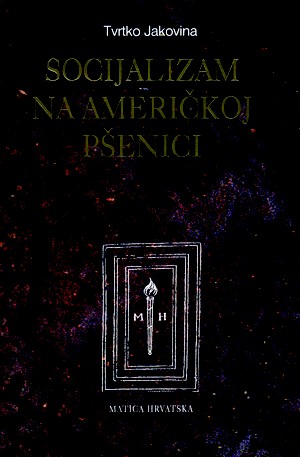Knjige
Socijalizam na američkoj pšenici
Znanstveno-povijesna knjiga o hladnoratovskome razdoblju pokušava na temelju dostupnih američko-hrvatskih arhivskih izvora i relevantne literature rasvijetliti petnaestogodišnju vanjsku politiku Brozove Jugoslavije, a posebice vanjsko-političke odnose između Jugoslavije i Sjedinjenih Američkih Država u razdoblju između Beogradske deklaracije (1955) i Titova susreta s Kennedyjem u Bijeloj kući (1963). Zašto je Washington neprestance vojno-materijalno pomagao Jugoslaviju, unatoč jugoslavensko-sovjetskom pomirenju, rigidnome komunističkom stavu jugoslavenskoga vodstva i velikim krizama u međusobnim, jugoslavensko-američkim odnosima? Kako je Tito balansirao između dva zavađena hladnoratovska svijeta koristeći treći za vlastitu promidžbu? Tko su bili glavni kreatori američko-jugoslavenske vanjske politike u tome razdoblju? U čemu su pogriješili američki diplomati i analitičari?
To su samo neka od važnijih pitanja na koja pokušava u ovoj knjizi odgovoriti Tvrtko Jakovina (Požega, 1972), asistenet na Katedri za opću povijest novoga vijeka zagrebačkoga Filozofskog fakulteta, Fulbrightov stipendist. Glavna su područja njegova znanstvena istraživanja povijest SAD-a i hladnoratovsko razdoblje. Istražuje u američkim državnim i predsjedničkim arhivima i knjižnicama. Ova je knjiga njegov prošireni magistarski rad obranjen 1997. na flamanskome Katholieke Universiteit Leuven.
Pročitajte više o knjizi iz recenzije Tihomira Ponoša objavljene u Vjesniku, (23. travnja 2003., str 16).

recenzija knjige
SUMMARY
Starting with the late 1940’, (the Yugoslav expulsion from the Information Bureau and breaking of alI relations with Moscow and her satellites had occurred in 1948) Tito’s Yugoslavia become one of world’s largest recipients of American economic and military aid. The situation was unique, because the regime in Belgrade stayed deeply devoted to Marxism, but opposed to Soviet hegemony and imperialism.
This book, which is based on published sources of the American State Department and literature, describes the dynamics of the foreign relations between Belgrade and Washington from 1955 to 1963. During those years the USA—Yugoslav foreign relations had two low points. The first one occurred in 1957, when the US military aid was terminated. The second occurred in 1962, after the US denied the most—favoured—nation customs treatment to Yugoslavia.
Although some historians think that Yugoslav relations with Moscow were better during her strained relations with Washington, this is an oversimplification. Tito had provoked the second break with the Soviet Union during the period of improving relations with Moscow. Similarly, the Constitution of the Socialist Federal Republic of Yugoslavia, adopted in 1963, made the way for the most ambitious set of market-oriented changes undertaken anywhere in Communist world, only few months after the US denied of the MFN treatment to Yugoslavia. The new Constitution was adopted during the improving relations with the Soviet Union, and deteriorating with the USA. Tito’s Yugoslavia also showed that no matter how anti—Communist was the rhetoric of Eisenhowers Secretary of State John F. Dulles, he was willing to support clearly Communist regime in Belgrade. As long as Tito was representing factor of disruption and annoyance for the Soviet Union, and his army was blocking the Soviet access to the Adriatic Sea, his regime was worth every dollar American government pumped in.
To su samo neka od važnijih pitanja na koja pokušava u ovoj knjizi odgovoriti Tvrtko Jakovina (Požega, 1972), asistenet na Katedri za opću povijest novoga vijeka zagrebačkoga Filozofskog fakulteta, Fulbrightov stipendist. Glavna su područja njegova znanstvena istraživanja povijest SAD-a i hladnoratovsko razdoblje. Istražuje u američkim državnim i predsjedničkim arhivima i knjižnicama. Ova je knjiga njegov prošireni magistarski rad obranjen 1997. na flamanskome Katholieke Universiteit Leuven.
Pročitajte više o knjizi iz recenzije Tihomira Ponoša objavljene u Vjesniku, (23. travnja 2003., str 16).
recenzija knjige
SUMMARY
Starting with the late 1940’, (the Yugoslav expulsion from the Information Bureau and breaking of alI relations with Moscow and her satellites had occurred in 1948) Tito’s Yugoslavia become one of world’s largest recipients of American economic and military aid. The situation was unique, because the regime in Belgrade stayed deeply devoted to Marxism, but opposed to Soviet hegemony and imperialism.
This book, which is based on published sources of the American State Department and literature, describes the dynamics of the foreign relations between Belgrade and Washington from 1955 to 1963. During those years the USA—Yugoslav foreign relations had two low points. The first one occurred in 1957, when the US military aid was terminated. The second occurred in 1962, after the US denied the most—favoured—nation customs treatment to Yugoslavia.
Although some historians think that Yugoslav relations with Moscow were better during her strained relations with Washington, this is an oversimplification. Tito had provoked the second break with the Soviet Union during the period of improving relations with Moscow. Similarly, the Constitution of the Socialist Federal Republic of Yugoslavia, adopted in 1963, made the way for the most ambitious set of market-oriented changes undertaken anywhere in Communist world, only few months after the US denied of the MFN treatment to Yugoslavia. The new Constitution was adopted during the improving relations with the Soviet Union, and deteriorating with the USA. Tito’s Yugoslavia also showed that no matter how anti—Communist was the rhetoric of Eisenhowers Secretary of State John F. Dulles, he was willing to support clearly Communist regime in Belgrade. As long as Tito was representing factor of disruption and annoyance for the Soviet Union, and his army was blocking the Soviet access to the Adriatic Sea, his regime was worth every dollar American government pumped in.
Povijesna knjižnica, knj. 3, glavna urednica Jelena Hekman, urednik Ivica Prlender. - Bibliografija ; bibliografske bilješke uz tekst ; summary ; imensko kazalo. - Ilustrirano
Autori
- biblioteka: POVIJESNA KNJIŽNICA
- cijena: RASPRODANO!
- broj stranica: 199
- uvez: broširan
- dimenzije: 14 x 21 cm
- godina izdanja: 2002.
- izdavač: Matica hrvatska
- mjesto: Zagreb
- ISBN: 953-150-676-2
- područje: svjetska povijest
Klikni za povratak






